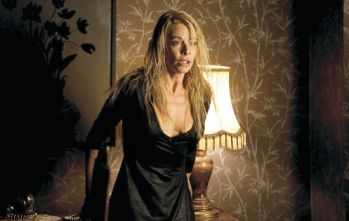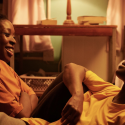Feminism it certainly isn’t, though it is bizarrely refreshing to observe that the heroine fleeing a maniac in a state of comely undress is in her mid-forties. It might be baby steps rather than huge strides of progress but nevertheless, The Orphanage’s Belén Rueda once again makes a cheeringly mature and cerebral, yet still hauntingly beautiful scream siren. It’s a shame that Julia’s Eyes as a whole lacks her class and consistency.
The Spanish director Guillem Morales’s second feature (after 2004’s The Uncertain Guest) is an entertaining shambles which begins with the death of Sara (Belén Rueda), a blind former musician. Her swinging corpse is discovered by her twin sister Julia (Rueda again) who shares the same degenerative sight disease. Convinced that her sister has been murdered, presumably by the mystery man she was dating (whom no one seems to be able to recall) Julia begins to investigate, much to the chagrin and concern of her seemingly well-intentioned husband Isaac (Lluís Homar).
This kind of psychological thriller/horror is well-trodden territory and Julia’s Eyes often feels derivative. So, tick off from your horror checklist: shadows illuminated by lightening; a parking garage sequence (which fails to deliver any real frights); the inexplicable allure of lonely crime scenes; basements; mirrors; a scary kid; and Peter Lorre-esque fruitcakes who appear like insects out of cracks. There are shades of Wait Until Dark (1967) and The Orphanage (2007), the overarching histrionics of an Italian giallo, as well as the presence of a Hitchcockian McGuffin in the shape of a mysterious key.
Whereas The Orphanage (with which it shares its female lead and a star producer in Guillermo del Toro) distinguished itself by its oppressive sense of menace, and predominantly avoided cheap shocks, Julia’s Eyes has few such compunctions. Having said that, there is something gloriously unabashed about the melodrama of its machinations (enhanced by a score which lays it on thick) and, to its credit, hamming it up is certainly in keeping with the approach of a giallo. In this case, unfortunately, the scares lack punch and tension haemorrhages in between the “money” scenes.
 Some sequences are marred by an almost comic misjudgment. When Julia eavesdrops on a group of naked blind gossipers in a changing room (who for the purposes of horror are somewhat grotesque) they are coincidentally discussing her sister. She quickly finds herself flailing helplessly amongst them before they reveal in a dramatic (read daft) fashion that a man has followed her in unnoticed. There’s also a varicose vein of sentimentality running throughout the film which rankles, but which might have worked better if it had at least been undercut by scares.
Some sequences are marred by an almost comic misjudgment. When Julia eavesdrops on a group of naked blind gossipers in a changing room (who for the purposes of horror are somewhat grotesque) they are coincidentally discussing her sister. She quickly finds herself flailing helplessly amongst them before they reveal in a dramatic (read daft) fashion that a man has followed her in unnoticed. There’s also a varicose vein of sentimentality running throughout the film which rankles, but which might have worked better if it had at least been undercut by scares.
It is far from without merit, however, and several moments stand out: there’s a smart instance of misdirection when what we initially assume to be Julia’s point of view is gradually and chillingly revealed to be the killer’s; at one point Julia is forced to employ her mobile phone as an all too inadequate flashlight in a claustrophobically tight space; a gloved hand which appears on the dresser while she sleeps is, though hardly original, frightening enough. Morales depriving us of characters’ faces when Julia’s own sight fails her is also a nice, if ultimately self-defeating, touch.
Rueda excels as the impossibly brave and resourceful Julia. Briefly appearing in a dual role, she is ultimately tasked with the portrayal of a character in severe physical and emotional distress who appears for long stretches with her eyes bandaged, and is frequently required to play blind or semi-blind. It’s a heightened performance and one of such integrity that it ensures we are closely aligned to her throughout. Maintaining the audience’s interest rests on Rueda’s shoulders alone in a world where others exist purely to behave suspiciously.
As a whodunnit, Julia’s Eyes is comparable to TV’s Columbo. The film seems less interested in concealing the killer’s identity and more caught up in the twisted anticipation of the dreaded reveal, which incidentally occurs long before the film draws to a close.
Spain has produced, or had a hand in, the production of some terrific horror/thrillers in recent years: The Devil’s Backbone (2001), Pan’s Labyrinth (2006), The Orphanage (2007), REC (2007), Timecrimes (2007), and unfortunately Julia’s Eyes isn’t worthy of association. It’s a diverting enough couple of hours that you’ll spend in only mild discomfort: not enough of a screamer, then, but not exactly a stinker either.
Watch the trailer for Julia's Eyes
{youtube}dLhyz_DtlbQ {/youtube}














Add comment